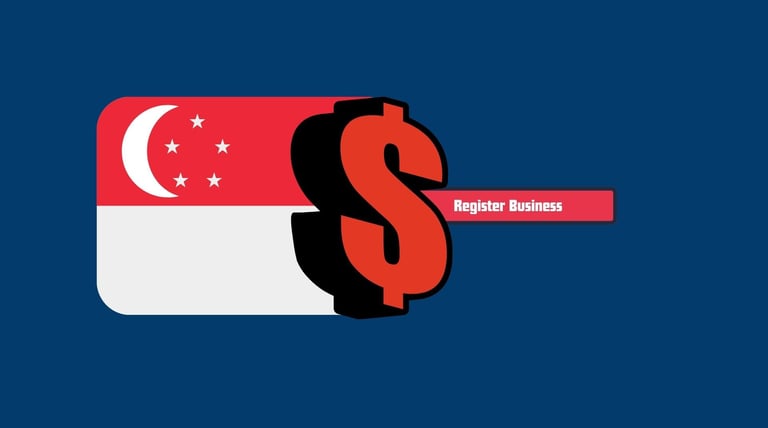How to Start a Business in Singapore?
BUSINESS TIPSSINGAPORE
Alan Wong
4/23/20249 min read


Starting a Business in Asia Hub - Singapore
Asia's economic landscape is undergoing a transformative bloom, attracting entrepreneurs globally with its vibrant markets, escalating purchasing power, and robust government support.
These enticing factors make Asia a hotbed for innovation and business, promising a wealth of opportunities for those looking to embark on entrepreneurial ventures.
This blog series aims to unravel the complexities of starting a business in Singapore.
Is Singapore a good place to start a business?
Singapore's reputation as a global business hub is unmatched, renowned for its unparalleled business-friendliness, and consistently securing top positions in the World Bank’s Ease of Doing Business rankings.
This recognition, coupled with high marks for its intellectual property (IP) protection infrastructure and incentives as noted by the World Economic Forum’s Global Competitiveness Reports, underscores Singapore's dedication to fostering a business and innovation-friendly environment.
The city-state's strategic Southeast Asian location, proximity to economic giants, excellent connectivity via Changi International Airport, and one of the world's busiest seaports, position it as an attractive center for international trade and business.
Singapore's vibrant trade, manufacturing, and finance sectors thrive within a robust free-market economy, celebrated for its competitive tax regime—including low corporate and value-added tax rates and the absence of capital gains tax—and 100% foreign ownership policy, allowing full control to international entrepreneurs without local partnerships.
The combination of flexible banking facilities and a stable political and social backdrop further enhances Singapore’s allure, offering a secure environment for business operations and growth.
Moreover, the support for startups through various government grants, funding, and subsidies, along with a streamlined process for business incorporation via the Accounting and Corporate Regulatory Authority (ACRA)’s digital system, facilitates a swift and efficient setup process.
These comprehensive features make Singapore a premier destination for entrepreneurs worldwide, blending ease of doing business with comprehensive support measures, strategic advantages, and a commitment to fostering innovation and entrepreneurial success.
How to register a company in Singapore?
Here's a step-by-step guide to navigating the process of establishing a business in Singapore.
Step 1: Choose Your Business Structure in Singapore
Your journey begins with selecting the right business structure, which is pivotal in determining your company's legal and operational framework.
Singapore offers several business structures to cater to the diverse needs of entrepreneurs and each structure has its unique features and implications on liability, taxation, and operational flexibility:
Sole Proprietorship
Partnership
Limited Partnership
Limited Liability Partnership
Local Company includes Private Company Limited by Shared, Exempt Private Company, Public Company Limited by Shared, Public Company Limited by Guarantee.




Step 2: Secure a Business Address in Singapore
In Singapore, your business must have a registered address, which cannot be a P.O. Box. For local companies and limited liability partnerships, this address must be in Singapore but need not be the company's operational site.
Business owners and company officers must also disclose their residential addresses upon registration, which become publicly available.
To maintain privacy, you can opt for an Alternate Address for a fee of SG$40.00.


Step 3: Reserve Your Business Name in Singapore
Choosing a unique and compliant business name is crucial.
The process involves checking for name similarities, trademark conflicts, and adhering to ACRA's guidelines to avoid names that are identical, undesirable, or prohibited.
Once you've decided on a name, you can reserve it for up to 120 days before registering your business, with an application fee of SG$15.00.
Step 4: Register with ACRA in Singapore
Registration with the Accounting and Corporate Regulatory Authority (ACRA) is an essential step for anyone looking to engage in business activities within Singapore.
Utilizing BizFile+, ACRA's online filing and information retrieval system, simplifies the registration process, allowing for electronic submission of documents and applications directly to ACRA.
This platform is integral for both local and foreign entrepreneurs in managing their business registration and compliance with regulatory requirements.
The requirements for registration vary depending on the chosen business structure, including specific eligibility criteria for owners and the stipulation that companies must have at least one director who is a resident of Singapore.
For foreign entrepreneurs who cannot meet these residency requirements directly, it is mandatory to engage a registered filing agent in Singapore to facilitate the registration process on their behalf.
Additionally, foreign companies have the option to establish a presence in Singapore by opening a Representative Office as a temporary arrangement for conducting market research and testing activities.
This option is particularly suitable for companies exploring the Singapore market without engaging in commercial sales.
The specific agency to approach for registration depends on the industry:
Banking, finance, and insurance sectors should contact the Monetary Authority of Singapore (MAS).
For legal services, the Legal Services Regulatory Authority is the relevant body.
Enterprises in manufacturing, international trading, wholesale, trade, and trade-related business sectors should reach out to Enterprise Singapore.
Registering with ACRA and opting for the appropriate establishment option not only confers legitimacy on your business but also unlocks access to government funding, tenders, and protection for intellectual property, establishing a solid foundation for your business operations in Singapore.
Understand the Singapore Standard Industrial Classification (SSIC)
Selecting the correct SSIC code is vital as it classifies your business activity and is used by government agencies for statistical and policy purposes.
This classification aids in the precise identification of your business operations within Singapore's economic landscape.


Step 5: Register a Corppass Administrator Account in Singapore
In Singapore, registering a Corppass Administrator Account is a crucial step for businesses to access and manage government digital services securely.
Corppass, which stands for Corporate Pass, is the single sign-on mechanism for entities to transact with government agencies online.
The registration process for a Corppass Administrator Account involves several key steps, designed to authenticate and authorize individuals who can act on behalf of the company in managing digital service access.
This comprehensive process ensures that businesses can safely and efficiently handle their governmental transactions, from tax filings to permit applications, through a centralized digital platform.
It's tailored to bolster cybersecurity while facilitating ease of access to a wide array of public services, making it an indispensable tool for businesses operating in Singapore's digitally forward economy.
For detailed guidance and to initiate the registration, entities can visit the official Corppass website, which provides a step-by-step walkthrough, ensuring that even those without a UEN or Singpass can navigate the process smoothly and secure their account setup effectively.


Step 6: Open a Corporate Bank in Singapore
Opening a corporate bank account in Singapore marks the crucial last step in solidifying your business's financial infrastructure.
It's a process that separates your company's financial activities from your personal ones, streamlining cash flow management, business payment, payment processing, and financial reporting.
The regulatory clarity and favorable business conditions in Singapore serve as a fertile ground for such financial structuring, catering to the needs of both local operations and international trade.
Several leading banks in Singapore offer specialized accounts catering to the needs of small and medium-sized enterprises (SMEs) with multi-currency and online banking options that are conducive to businesses with an international presence or those looking to expand beyond Singaporean shores.
For example, the DBS Business Multi-Currency Account allows transactions in SGD and 12 other currencies and offers perks such as free transfers and competitive FX rates, particularly beneficial to newly incorporated businesses through their Business Account Starter Bundle.
OCBC offers a low-cost Business Growth Account, ideal for Singapore-registered businesses, with a low initial deposit and rewards on business expenses.
UOB’s eBusiness Account is attractive to young entrepreneurs, offering the lowest minimum daily balance and annual account fee among UOB's corporate options, along with free transactions and an SME app for financial insights.
For SMEs looking to accelerate growth beyond local borders, the Airwallex Business Account emerges as a comprehensive financial platform regulated by the Monetary Authority of Singapore, ensuring cost-effective international transactions and currency exchanges at interbank rates.
To open a business account, the process typically involves a director or an authorized signatory of the company, who is recognized in the company’s Board Resolution.
Banks will require a suite of documents to comply with Anti-Money Laundering (AML) regulations and to verify the legitimacy of your business and the identities of key individuals associated with it.
Essential documents include a Company Business Profile from ACRA, identification documents of directors and signatories, proof of residential address, Certificate of Incorporation, a Board Resolution authorizing account opening, and the Company’s Constitution.
With the right preparation and understanding of the requirements, setting up a corporate bank account in Singapore is a straightforward procedure, allowing businesses to quickly establish their financial presence and start their entrepreneurial journey in Asia’s most dynamic business hub.
Can Foreigners Register a Business in Singapore?
Registering a foreign company in Singapore offers a gateway for international businesses to tap into the thriving Asian markets, with four distinct avenues to establish their presence.
One option is the Transfer of Registration, which allows a foreign company to relocate its registration to Singapore, effectively becoming a Singapore-incorporated entity.
For businesses looking to explore the market before committing fully, Setting up a Representative Office provides a non-commercial operational foothold, ideal for conducting market research and facilitating liaison activities.
Alternatively, Incorporating a Subsidiary or Local Company enables a foreign company to operate with a distinct legal identity in Singapore, offering a blend of operational independence and compliance with local business laws.
Lastly, Registering a Branch of a Foreign Company is an extension of the parent company, allowing it to engage in revenue-generating activities under the foreign company's name, subject to Singapore's regulatory requirements.
For more details, you can visit the Accounting and Corporate Regulatory Authority (ACRA).




How much to register a business in Singapore?
Registering a business in Singapore involves specific government fees, a necessary step managed by the Accounting and Corporate Regulatory Authority (ACRA), which is responsible for the registration of companies and the provision of a regulatory framework.
The process, executed online via the dedicated BizFile+ platform, includes two main fees: the company name reservation fee and the company registration (incorporation) fee.
The name reservation fee is set at SG$15.00, allowing potential business owners to secure their chosen company name for up to 60 days once it's deemed available.
Following the reservation, the incorporation process can proceed, incurring a fee of SG$300.00.
This online registration process is efficient, typically taking about 20 minutes for companies with 2-3 directors and shareholders, although it may extend slightly with more individuals involved due to the need for additional personal data.
Generally, both fees are paid simultaneously at the registration's conclusion, although the name can be reserved in advance if necessary.
Additionally, while business owners must provide their residential address at registration—publicly accessible upon purchase—there's an option to submit an Alternate Address for SG$40 to protect privacy, ensuring it appears in public records instead of one's personal address.
For detailed consultancy and a partner that understands the depth of Asia's business environment, reach out to us, ToAsia.biz, and take the first step towards your success in Asian market.


Singapore Government Grants and Resources Support for Startups
In Singapore, startups can take advantage of a robust ecosystem designed to support innovation and growth, particularly through various grants and funding schemes.
A key initiative in this landscape is the Startup SG Equity, which provides financial support to technology startups with the potential to innovate and scale.
Under this scheme, the government co-invests with qualified third-party investors to help startups raise capital.
For startups enhancing the tech ecosystem, the government's co-investment ratio can be as high as 70%.
The cap for government co-investment in each startup is S$2 million, which is a significant boost for qualifying enterprises aiming to make a substantial impact in their respective industries.
Here's a list of some notable grants and funding sources available to startups in Singapore:
Startup SG Founder: Offers grant support to first-time entrepreneurs with innovative business ideas.
Startup SG Tech: Fast-tracks development of proprietary technology solutions.
Startup SG Equity: Aims to stimulate private-sector investments into innovative, Singapore-based technology startups.
Startup SG Accelerator: Enhances the capabilities of accelerators and incubators.
Startup SG Talent: Attracts and develops talents for startups.
Startup SG Loan: Provides government-backed loans for startups in need of financing.
Productivity Solutions Grant (PSG): Encourages the adoption of IT solutions and equipment to improve productivity.
Market Readiness Assistance (MRA) Grant: Supports Singaporean companies in taking their business overseas.
Each of these programs is designed to address specific needs within the startup lifecycle, from ideation to scaling, ensuring that entrepreneurs have access to the necessary resources to succeed.


Alan Wong is founder of ToAsia.biz and a startup mentor with over 20 years of professional experience managing software, Saas and consulting services MNCs.
About Author
Copyright © 2026 ToAsia.biz


We lead your business to Asia
Our Business Growth Experts help SaaS businesses achieve growth in Asia and become profitable FAST.
Send us a message via WhatsApp
